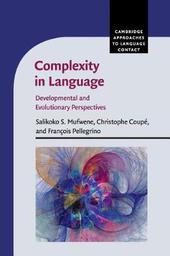
|
Complexity in Language: Developmental and Evolutionary Perspectives
Paperback / softback
Main Details
Description
The question of complexity, as in what makes one language more 'complex' than another, is a long-established topic of debate amongst linguists. Recently, this issue has been complemented with the view that languages are complex adaptive systems, in which emergence and self-organization play major roles. However, few students of the phenomenon have gone beyond the basic assessment of the number of units and rules in a language (what has been characterized as 'bit complexity') or shown some familiarity with the science of complexity. This book reveals how much can be learned by overcoming these limitations, especially by adopting developmental and evolutionary perspectives. The contributors include specialists of language acquisition, evolution and ecology, grammaticization, phonology, and modeling, all of whom approach languages as dynamical, emergent, and adaptive complex systems.
Author Biography
Salikoko S. Mufwene is Professor of Linguistics and member of the Committee on Evolutionary Biology and the Commitee on the Conceptual and Historical Studies of Science, at the University of Chicago. He is the author of The Ecology of Language Evolution (Cambridge, 2001), Creoles, ecologie sociale, evolution linguistique (2005), and Language Evolution: Contact, Competition and Change (2008). He has edited several books, including Iberian Imperialism and Language Evolution in Latin America (2014). He is the founding editor of the Cambridge Approaches to Language Contact series. His research includes the emergence of creoles, the phylogenetic emergence of language, and globalization and language vitality. Christophe Coupe is a researcher in cognitive science at the Centre National de la Recherche Scientifique (CNRS), Paris and Universite Lumiere Lyon II, France. With a background in computer science, cognitive science and psychology, he has been involved in several multidisciplinary programs focusing on language complexity, language origins and language change. His contributions have mostly consisted of the design and analyses of databases, and of statistical or computational models of linguistic evolution and diversity. In 2003, he received the Prize of the Young Researcher of the city of Lyon for his Ph.D. dissertation on the origins of language. In addition to other papers on phonological complexity, information rate and functional load, he has co-edited the collective volume Approaches to Phonological Complexity (2009). Francois Pellegrino is a senior researcher in linguistics and cognitive science at the Centre National de la Recherche Scientifique (CNRS), Paris and Universite Lumiere Lyon II, France. He has coordinated several projects on language complexity and has been the coordinator of the 'Laboratory of Excellence' ASLAN (Advanced Studies on Language Complexity) since 2011. For more than ten years, his research has focused on the structure and dynamics of phonological systems in the light of the science of complexity and of Shannon's information theory. He has co-edited the collective volume Approaches to Phonological Complexity (2009) and, over the last fifteen years, he has authored or co-authored about eighty journal articles, book chapters or conference papers.
|